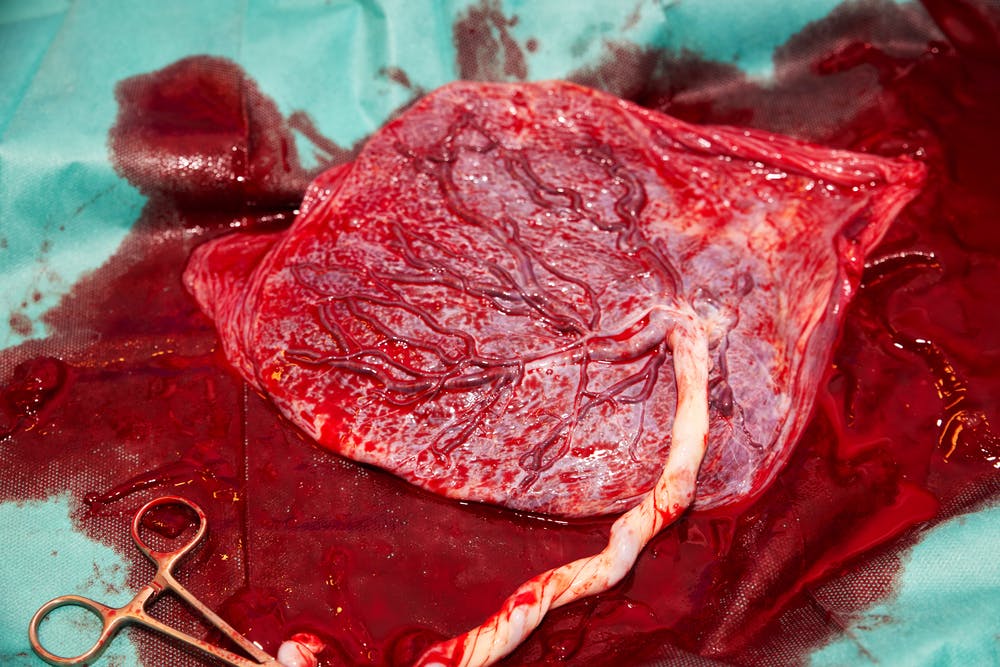Placentophagy – the practice of consuming the placenta – has gained popularity in recent years. Its proponents claim it has a range of health benefits, from upping iron levels to improving mood.
But a new recommendation by the Society of Obstetricians and Gynaecologists of Canada (SOGC) strongly disagrees, noting that eating your placenta has zero known health benefits and can even cause harm.

The placenta is an organ that forms during pregnancy and attaches to the lining of the womb. It delivers important nutrients and oxygen from the mother’s blood to the baby, which is attached to the placenta via the umbilical cord. It releases hormones that aid the baby’s growth and helps protect it from bacterial infections.
But while placentas are clearly beneficial to the health of unborn babies, that really doesn’t mean us adults should be eating them. Advocates of the rather grim practice say eating your own placenta – either raw, cooked, or in pills or smoothies – boosts iron levels, increases milk supply, and even improves mood.
Although these “benefits” might sound appealing to exhausted mothers who have recently given birth, the new recommendation by the SOGC strongly suggests otherwise.
“Currently, there is no strong evidence to suggest that placental consumption is beneficial for human health,” said Dr Jocelynn Cook, chief scientific officer of the SOGC. In fact, a new study published just last week found that eating the placenta makes no difference to postpartum depression, lactation, energy levels, or vitamin B12 levels.
What does the animal kingdom say?
Many advocates use the argument that wild animals often eat their placentas. While this is true, many wild animals also eat their own children. Perhaps we shouldn’t be using them as a guide. It’s not totally clear why some mammals consume the placenta, but it might be to do with nutrition or pain relief, or to protect their young from predators who, by smelling the fresh placenta, might infer a tasty newborn snack is up for grabs.
Still, a multitude of species don’t do it, so we’re not exactly missing out.
Benefits of eating the placenta
A simple Google search comes up with various websites purporting the idea that consuming the placenta helps new mothers recover faster and “avoid the baby blues”. Funnily enough, you can pay these companies to encapsulate your placenta into easy-to-swallow pills. One site even sells sheep placenta capsules, which they claim “help rejuvenate the body and skin”.
Any negative aspects?
In addition to not having any proven health benefits, eating your placenta can actually cause harm, notes the SOGC. Poor handling of placentas and improper sterilization can lead to contamination with dangerous bacteria, viruses, and fungi, which can make you, and even your baby, sick.
In 2017, the Centers for Disease Control and Prevention (CDC) detailed a case study of a woman who transferred group B streptococcus, a bacterial infection commonly found in the vagina, to her baby via placenta capsules. The company that produced the pills didn’t heat the placenta sufficiently to kill the bacteria, so it’s thought it colonized the mother’s skin and intestines and was transferred to her baby via her breast milk.
“The scientific research shows that there is both potential and documented harm associated with the consumption of human placenta,” added Dr Cook.
The possible benefits of eating the placenta are still understudied, so future research might shed more light. But for now, there is no solid evidence to back up the claims and we know the practice can be unsafe. Unless you’re a rat, a goat, or a chimpanzee, we recommend keeping your placenta well away from your mouth.
Are you a cannibal?
In a bid to get to the psychological root cause of pathological cannibalism (as opposed to ritual and survival cannibalism), scientists compared the cases of five cannibalistic patients (all male, all aged 18 to 36) hospitalized in a secure unit in Villejuif, France.
They found that there were two groups: those suffering from severe schizophrenia and those suffering from a mixed personality disorder with sadistic and psychopathic features associated with extreme paraphilia. One factor that unites all five cases, the researchers found, was a dysfunctional childhood with sexual abuse, violence at home, or emotional neglect.
Hopefully, people eating their placentas don’t fall in one of those two categories. 😉 Personnally, I buried the placentas of my two children under a tree. What about you?
[Science Direct, ncbi, IFLScience]












This “article” is completely opinion based and incredibly damaging.
Don’t go around scarying new moms from something completely natural and healthy just because you wouldnt choose it for yourself.
For the Malays ethnics, it is a culture and religiously as a respect to the “owner” of the placenta, that when baby is born, the placenta will be brought home and properly buried in a good place anywhere around the house yards.
This is what I did too for my two children…
It is well known among midwives that a 2″ square of placenta for mother’s having given birth, when consumed by the new mother, helps to constrict the blood vessels of the uterus; and in so doing, helps to prevent the mother from bleeding to death. It also aids the mothers in beginning lactation of their colostrum and milk for their baby or babies.
Long ago, American Indian mothers also did this as a natural process of giving birth. It is not cannibalism, by any stretch of the imagination. It is a simple biological process since the hormones in the placenta are exactly what nature ordered to complete the birthing process.